Community led cafes to cut fuel poverty and energy use
Nationally, the health impact of fuel poverty and cold housing is estimated to cost the NHS £2.5 billion/year. Studies show that those living in homes with bedroom temperatures below 15°C are 50% more likely to suffer from mental health problems, and children living in inadequately heated households are more than twice as likely to suffer from asthma and bronchitis. Poor energy efficiency is a key factor in fuel poverty. Improving the energy efficiency of the UK housing stock provides an opportunity to reduce costs to the NHS, tackle inequality and create a large number of jobs.
South East London Community Energy (SELCE) is a community benefit society (Ben Com), mainly funded through grants and donations. It has been working in the boroughs of Lewisham and Greenwich to tackle fuel poverty over several years. SELCE holds regular energy cafes where members of the public receive free advice on their energy bills as well as tips on how to improve the energy efficiency of their homes. Recognition of their excellent work in community outreach is growing, with the charity now working with several local councils and co-operatives to help further in the battle against fuel poverty. SELCE is capitalising on the power of community, resulting in people having warmer and healthier homes whilst also tackling sustainability and reducing the carbon footprint of the area. Started by volunteers, the organisation now employs 10 staff part-time. SELCE part-funds community work through the installation of renewable energy on local community buildings generating revenue from electricity sales. Other key services that SELCE offers include free training for community groups already attempting to reduce fuel poverty. This increases the impact and reach that these community groups are having, allowing even wider community involvement. SELCE also works with community hubs including schools, leisure centres and churches, enabling these groups to improve energy efficiency and reduce energy costs whilst also decreasing carbon emissions, for example through the installation of solar panels on their buildings.
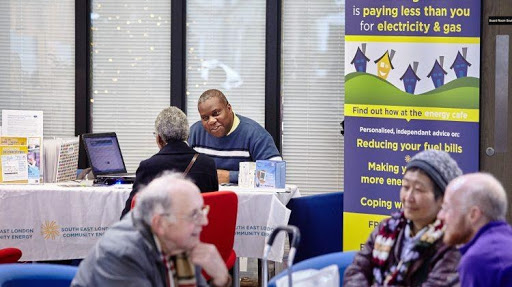
Green Open Homes
Green Open Homes is a community-led national network originally set up by Centre for Sustainable Energy and now run by volunteers. The network organises open home events to promote and teach low-carbon practices. Through these events, pioneering households across the nation open their doors to fellow community members to demonstrate the actions they have taken to ensure their homes are warmer, healthier and greener. Here, carbon-conscious attendees can learn how to make low-cost improvements, switch to renewable electricity and heating sources as well as how to undertake ambitious whole-house retrofit projects. Green open home owners will often share details of recommended local installers of energy efficiency measures, and this is a great way of boosting small businesses with co-benefits for the local economy. Events run across the country each year, including in Dorset, Manchester, London and East Sussex. One of the longest running local networks is Bristol Green Doors which welcomed hundreds of visitors to local homes in 2019.
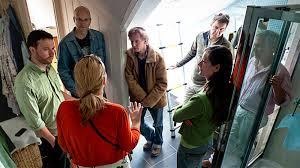
Mums for Lungs – campaigning for clean air
Mums for Lungs is a group of London parents with branches in different parts of the capital. They are united in their commitment to deliver clean air for everyone — for children and future generations. They are a grassroots organisation with no formal structure. Most members are ordinary people with no specialist background in air pollution who volunteer their time to campaign. Members campaigned for London’s Ultra Low Emission Zone (which began in 2019 and was extended in 2022) and also campaign for the replacement of diesel buses with hybrid or EV models as well as for the improvement of walking and cycling infrastructure. They have also encouraged the introduction of school streets ; members contacted 300 schools across London about the dangers of the capital’s toxic air to encourage them to embrace road closures at the start and end of each school day.
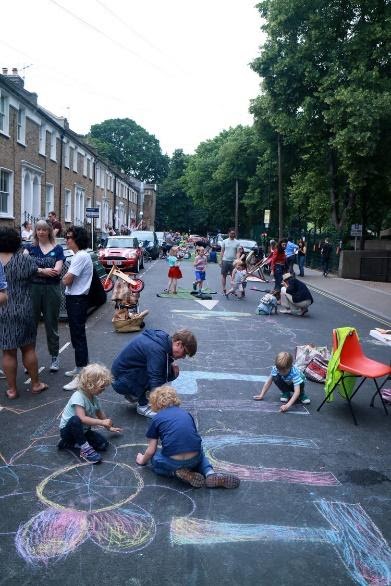
Community-led tree planting and care
Carbon sinks will play an important role if the UK is to meet its targets of becoming a net-zero carbon nation by 2050. Trees represent economical and effective carbon sinks, whilst also offering community co-benefits of renewed green space and a reduction in surface run-off water in flood-prone areas. Although on its own, increased tree planting may not solve the climate crisis, community-led tree planting schemes offer an effective method of initially engaging the local community in environmental action. The Helensburgh Conservation Trust, based in the small Scottish town of Helensburgh, also known as the ‘Garden City of Clyde’, is pioneering how communities can directly contribute to increasing greenery in their neighbourhoods. The Trust devised a system through which locals pay an annual £10 subscription to raise funds that enable trees to be planted across neighbouring streets and parks. This innovative community-led scheme has resulted in over 1000 trees being planted since 2002 thanks to the financial support of the Trust’s 200 members. Donations are used to purchase saplings from a Scottish nursery, as well as to replace trees damaged by storms or disease. A team of local volunteers then support and maintain the trees moving forwards.
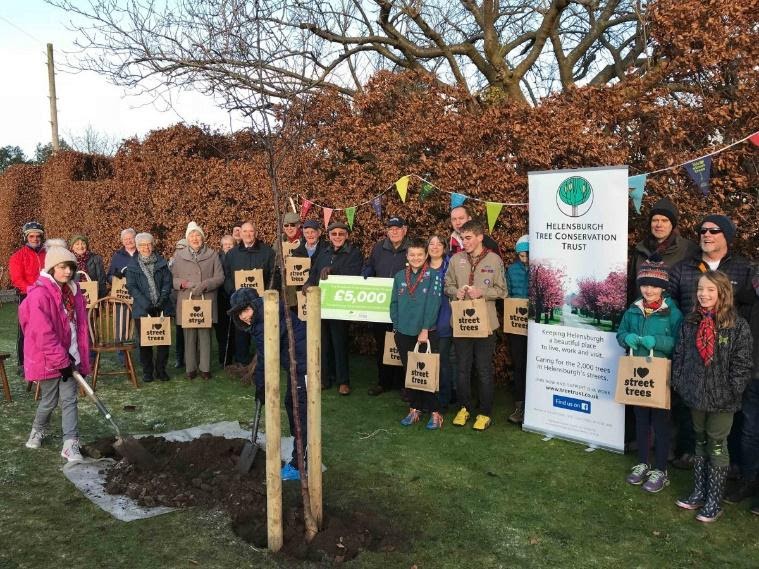
Green Gyms
The Conservation Volunteers have set up ‘Green Gyms’; fun and free outdoor sessions where participants will be guided in practical activities such as planting trees, sowing meadows and establishing wildlife ponds. Unlike other conservation projects, the emphasis is very much on health and fitness. In some areas, health professionals are adopting ‘social prescribing’, where patients are referred to a variety of local, non-clinical services including Green Gyms. Social prescribing offers a holistic approach for helping those struggling from a variety of issues from loneliness to unemployment. A University of Westminster study has revealed that social prescribing may reduce further GP consultations by 28%, offering welcome relief to the NHS and other key services. The demand for Green Gyms is growing with more launching each year, and there are now over 100. With the rise in physical inactivity, isolation and resulting mental health issues, Green Gyms provide opportunities for people to connect with nature and improve local green spaces, helping to build community resilience.
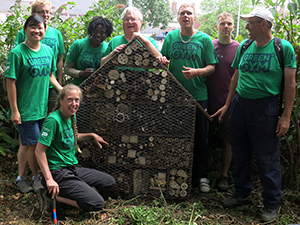
Sustrans School Streets – Southampton
Sustrans is a charity focused on making walking and cycling in the community easier. They have launched a school streets programme that is already having a major impact. Sustrans plan street closures close to schools in order to highlight the benefit of reduced congestion and increased air quality around schools. In this system, streets adjacent to schools effectively become closed at school opening and start times, with entrance only permitted for pedestrians, cyclists, residents and blue badge holders. At the start/end time each day, main roads by school entrances close for 30-60 minutes. Implementation varies with region, with London and Welsh councils supporting the system through automatic number plate recognition, whereas other councils are introducing temporary bollards or barriers to halt access.
Sustrans works with local authorities to develop and implement the programmes, developing plans that gain local support which are then developed into trial tests to demonstrate the impact of the initiative. This project has had particular success in Southampton primary schools, where the scheme has made journeys to school much cleaner whilst also reducing road safety concerns by schools. Parents were surveyed following the initial project launch and it was found that 92% agreed that the road had become safer to use, whereas 93% supported the initiative becoming a regular occurrence outside of their school.

Edinburgh’s proactive parent approach to healthier school streets
Sciennes Primary School introduced their school streets scheme initially as a pilot in 2015, but the resounding success of the trial soon ensured the project was implemented permanently. The system requires two volunteers per day to ensure drivers correctly follow traffic signs and alter their routes away from the school gates. The school has developed an online tool on their website which allows parents of pupils to volunteer to help run the system on a specific day whilst also displaying which days lack volunteers. This ensures that parents can share the responsibility of implementing the system whilst also ensuring that there are not days without traffic volunteers.
As explained by headteacher Andrew Hunter, the initiative has enabled students and parents to lead more active lifestyles with increases in walking and cycling seen across the year groups. Major reductions in congestion and traffic speed, in addition to reduced pollution, have made the surrounding environment at Sciennes Primary School a much safer and healthier place to learn. The initiative is supported by Edinburgh Council and enforced by Police Scotland, which issues penalty fines to drivers who ignore the road traffic signs and use the main road by the school entrance.
Zedify’s model is helping to create cleaner cities
Finalist for the 2019 Ashden UK Clean Air in Towns and Cities Award, Zedify, operate a fleet of e-cargo bikes to make almost 30,000 deliveries from consolidation hubs across the UK. Zedify provides a valuable zero-emissions urban delivery service for e-commerce companies and national logistics firms which replace their existing carbon-intensive freight deliveries for first and last mile journeys. With the parcel delivery market growing rapidly at approximately 7% a year, transforming this service into a carbon-free option will soon become a necessity for cities to meet their climate and air pollution targets. Zedify’s carbon-free solution for sustainability improvements represents a strong model for businesses operating in city centres to adopt and is one that will deliver results, unimpeded by freight restrictions that are already impacting cities across the UK.
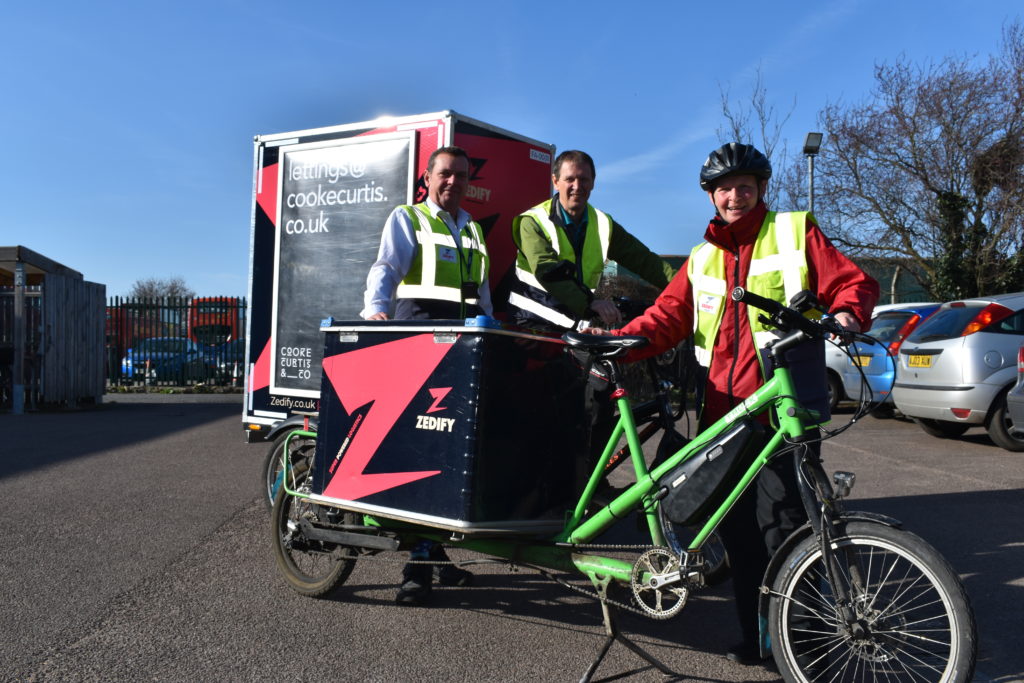
The Swan School – offering exclusively plant-based menus
Oxfordshire secondary school The Swan School has taken the radical decision to introduce a completely plant-based menu for all school meals. Headteacher, Ms Woods, explains that her reasons for doing so were based on improving the sustainability of the school, as well as the fantastic co-benefits of improved quality of food and greater pupil inclusion at lunch time. For the same price as a meat-based menu, the school’s caterers are able to provide students with meals that are more nutritious and equally as filling and enjoyable to pupils. The meat-free menu also forms the base for the school’s ‘family dining’ initiative in which all students and teachers serve and eat lunch together. A plant-based menu ensures there are no barriers preventing pupils from eating alongside one another, directly improving social cohesion and giving the school a positive community feel.
The Swan School introduced the plant-based menu when the school was first opened in 2019. However, their methods of engagement with pupils and parents offer an excellent example of how other schools might begin a meat-free transition. The Swan School’s engagement methods consisted of individual face-to-face meetings as well as informal events. The new menu was explained to each parent or carer through individual meetings, with parents given opportunities to ask questions and gain a further understanding on the culinary switch. On top of this, the school hosted taster evening garden parties where pupils and parents were able to trial the new menu and learn more in an informal setting.
Owing to the school’s thorough and inventive engagement strategy as well as the adoption of a clear vision for the future, the plant-based menu has been warmly received by pupils and parents alike.
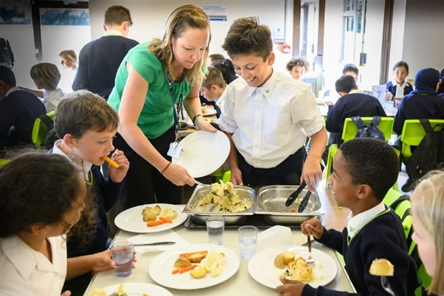
Our Bright Future
Our Bright Future is an ambitious and innovative partnership led by The Wildlife Trusts which brings together the youth and environmental sectors. This £33 million programme, funded by the National Lottery Community Fund, is formed of 31 projects across the UK. Each project is helping young people aged 11-24 gain vital skills and experience and improve their wellbeing. At the same time, they act as catalysts for delivering change for their local environment and community whilst contributing to a greener economy.
The organisation has already engaged 80,000 young people of all backgrounds as well as those with disabilities from across the UK. To aid further inclusion, many projects run as paid programmes and offer travel bursaries. The projects offered range from sustainable construction, environmental leadership and developing sustainable food systems to environmental campaigning, planning and decision making.
As well as providing opportunities and skills for young people, their work also delivers other far-reaching benefits. For example, their projects such as ‘Growing Up Green’ in Lincoln and Swansea-based ‘Building Sustainable Communities’ are having long-lasting positive impacts on local communities. On top of this, Our Bright Future is building a legacy by engaging young and enthusiastic trustees who will use their passion for the environment to support work on sustainability and climate action for years to come.
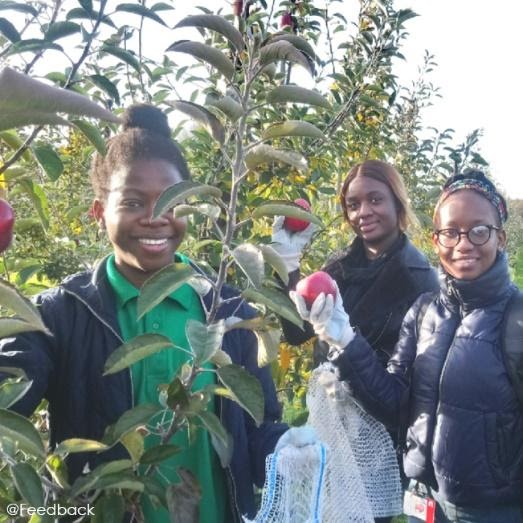
Oxford City Council – Setting high standards of public engagement through a Climate Change Citizens’ Assembly
Following their declaration of a climate emergency in January 2019, Oxford City Council orchestrated a Climate Change Citizens’ Assembly to determine whether the city should achieve carbon neutrality before the UK government’s target of 2050 and, if so, understand what trade-offs Oxford citizens would be prepared to make to achieve this target. The assembly, chaired by Councillor Susan Brown, was held across two weekends and consisted of 50 citizens. These participants were selected by a stratified random sampling process delivered by IPSOS Mori to ensure that participants were reflective of the Oxford community. £300 remuneration was also offered to encourage full participation from a diverse range of economic and social backgrounds. The first weekend saw participants hear from 27 climate expert speakers – from across local business, transport, community activist groups, Oxford University, local government, and more – on the fundamentals of climate change as well as the decarbonisation methods suitable to Oxford. During the second weekend, participants discussed individual subjects, with responses formulated into a set of recommendations from the assembly which were to be presented to Oxford City Council’s cabinet. Important findings from this process include confirmation that citizens support:
- The achievement of carbon neutrality before 2050;
- Enhancing biodiversity, green space and pedestrianisation in the city centre;
- The transformation of building standards to ensure buildings and homes can become more energy efficient; and
- Oxford taking a lead in facing the climate crisis
In response to these findings and recommendations, Oxford City Council announced an additional £19 million climate emergency budget to help decarbonise the city; organized a Zero Carbon Oxford summit for 2021 with the organisations responsible for the majority of the emissions in the city; and introduced its Oxford to Zero campaign with a particular focus on increasing community engagement. Forming the new Zero Carbon Oxford partnership, 21 leaders from Oxford’s universities, institutions, and large businesses signed the Zero Carbon Oxford charter to support the goal of Oxford being net-zero by 2040 and share best practice examples of climate action. The science-based roadmap approved by the partnership predicts Oxford’s carbon emissions will be reduced by 88% from 2018 levels by 2040. Achievements of the organisations so far include the planned installation of a geo-exchange heating and cooling system in Oxford Brookes University, which will reduce campus carbon emissions by approximately 20%, the investment of £14 million by the council to decarbonise public leisure centres in the city, as well as the launch of Oxford’s zero emission zone in 2022 helping to reduce transport emissions in the city.
Other examples
Some other examples of online engagement on climate action include:
- Between Sep-Oct 2021, Wiltshire council gave residents, businesses and local groups in the county the opportunity to feedback and ask questions on their draft climate strategy – over 1000 people and organisations participated
- Barnsley Council with the Centre for Sustainable Energy held an online consultation on the transition to net zero carbon which ran until Jan 2022
- Cornwall Council’s Carbon Neutral Cornwall Hive allows people to add their climate actions and learn about what others are doing to help tackle climate change
- Cheshire West and Chester have an online public participation platform where people can share what they’re doing locally and inspire others
Previous Section:
2.3 Winning over citizens
Next Section:
2.5 Useful resources

